

The growing trend of clustering revenue management positions has become quite evident. When executed correctly, becoming a Cluster Revenue Manager can lead to cost management, improved efficiency, and increased revenue. However, this role comes with its own set of challenges, primarily related to time constraints and accessing high-quality, accurate data.
When a revenue manager is responsible for managing three separately operated hotels within a cluster, it becomes challenging to maintain the same level of work that three individuals previously handled. The volume of internal, market, and competitor data that needs processing becomes overwhelming for a single person. Nevertheless, the challenges faced by a cluster revenue manager extend beyond this.
Let's examine five common issues they encounter and explore simple solutions to help overcome these problems, enabling all hotels within the cluster to maximize their revenue potential.
1. Managing high data volumes for multiple hotels
One of the most time-consuming aspects of a revenue manager's job today is data collection and processing. This often delays crucial tasks such as developing strategies and making pricing decisions, especially in dynamic markets, even for those overseeing a single hotel. As a Cluster Revenue Manager, the challenge intensifies when suddenly tasked with managing several properties. Data quality or the quantity of data collected may suffer, resulting in less-informed and strategic decision-making.
Rather than compromising on data quality or quantity, it is advisable to rely on a system for data processing. Modern Revenue Management Systems (RMSs) can collect and present real-time, 24/7 information for all properties within your cluster. Atomize, for example, exemplifies this capability by offering key performance indicators (KPIs) such as RevPAR, ADR, revenue, and occupancy for each property directly on the dashboard. Additionally, it provides the latest pick-up data, eliminating the need for manual reporting and enabling you to focus on strategizing.
2. Maintaining a comprehensive performance overview of all properties
Access to KPIs for various hotels is an essential initial step. However, comparing their performances becomes challenging when using separate reports, spreadsheets, or systems for each property, particularly when managing a cluster with different brands or multiple countries with distinct currencies. Converting everything into a single denomination manually is no easy task.
Once again, an RMS can assist. Systems like Atomize offer a side-by-side comparison of all hotels within your dashboard. With just a few clicks, you can filter by brand or region to analyze specific sets of properties. Moreover, you can select the currency in which you prefer to view all results, facilitating individual property evaluation within the larger portfolio. Furthermore, the system highlights properties that require immediate improvement, enabling you to direct your attention to the right hotels.
“With the Atomize multi-property dashboard I get a clear picture of how each property, brand, and region is performing and it helps us to identify revenue opportunities and which properties need action first,” says Eric Bergsten, Senior Revenue Manager at CIC Hospitality. This company has been using Atomize to manage all of its 20+ hotels.
3. Developing customized strategies and implementing live rate updates for each property
Each hotel within the cluster requires a unique revenue management approach. However, when a cluster revenue manager is burdened with tasks such as data collection and collation for all properties, it becomes challenging to allocate time for customized strategies. Resorting to blanket strategies with minimal customization may seem like the only option, but this approach leads to missed revenue opportunities.
This challenge can be tackled by utilizing an RMS that automatically provides all necessary information in an easily readable format. This saves time for individually evaluating each property and making informed decisions based on the current market conditions. Atomize goes a step further by offering real-time data insights and the ability to automatically adjust hotel rates as needed. This feature maximizes efficiency, ensures revenue opportunities are capitalized upon, and saves valuable time.
Atomize is a powerful solution combining artificial intelligence, pricing mechanisms, and real-time price optimization that has greatly benefited our hotels and supported our growth,” Eric goes on to say. “It has generated fantastic results for us. All of our properties run on full-price automation which means we save vast amounts of time; a working day per week, in other words, 30+ hours per month.”
Additionally, CIC Hospitality has managed to increase its portfolio’s overall RevPAR by 13% since implementing Atomize. Given results like these, it’s no wonder that more and more groups are implementing RMS with multi-property capabilities to manage their entire portfolio in one place.
4. Breaking down communication silos
For clusters to succeed, revenue, sales, and marketing teams must collaborate closely. Operating with individual agendas will not yield positive results. It is crucial to share data, establish cross-departmental objectives, and develop action plans collaboratively.
To achieve this, leverage an RMS and business intelligence tool that is user-friendly and provides relevant information to all commercial departments. Atomize offers property data useful for all departments, including pick-up figures, forecasts, and future demand insights through its partnership with OTA Insight. This particularly benefits sales and marketing teams, helping them identify target audiences for special campaigns.
5. Simplifying system logins for multiple properties
Although it may seem insignificant to those who do not experience it daily, repeatedly logging in and out of an RMS and similar systems to view different properties is time-consuming and cumbersome. Simplify your workflow by adopting a modern system that allows you to switch between managed properties in just two clicks, eliminating the need for repeated sign-ins. This saves time, minimizes frustration, and streamlines your entire workflow.
As you have likely experienced some of the challenges faced by cluster revenue managers, it is reassuring to know that many hoteliers have encountered similar obstacles. As more revenue service providers and hotel groups adopt cluster roles to enhance efficiency, the necessity for a powerful multi-property RMS becomes evident.
Ligula Hospitality is a prime example of this. To maximize their portfolio's potential, they implemented Atomize at 45 properties across six different brands in November 2021. Since then, they have observed remarkable results in terms of KPI growth and improved efficiency.
“Our team was impressed by the fully automated yielding performance that Atomize delivered during the benchmark period. Atomize is a next-gen RMS solution and we feel confident that the application will help us grow by increasing our revenues, and at the same time increase the overall operational efficiency for our staff”, says Fredrik Ternsjö, Head of Revenue, Distribution & Systems at Ligula Hospitality Group.
You can achieve similar results at your property with Atomize’s multi-property features. Book a demo now to see how it makes managing several hotels easier than you could ever imagine!







